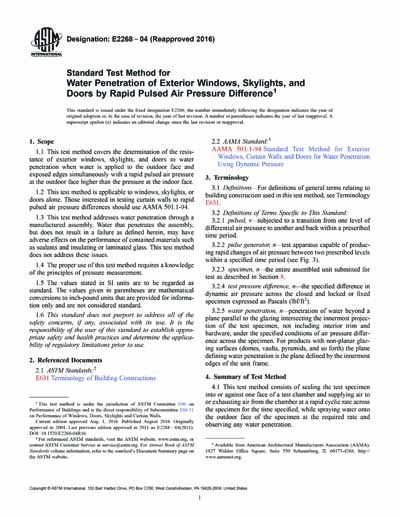Historical
ASTM E2268-04(2016)
Standard Test Method for Water Penetration of Exterior Windows, Skylights, and Doors by Rapid Pulsed Air Pressure Difference
1.1 This test method covers the determination of the resistance of exterior windows, skylights, and doors to water penetration when water is applied to the outdoor face and exposed edges simultaneously with a rapid pulsed air pressure at the outdoor face higher than the pressure at the indoor face.
1.2 This test method is applicable to windows, skylights, or doors alone. Those interested in testing curtain walls to rapid pulsed air pressure differences should use AAMA 501.1-94.
1.3 This test method addresses water penetration through a manufactured assembly. Water that penetrates the assembly, but does not result in a failure as defined herein, may have adverse effects on the performance of contained materials such as sealants and insulating or laminated glass. This test method does not address these issues.
1.4 The proper use of this test method requires a knowledge of the principles of pressure measurement.
1.5 The values stated in SI units are to be regarded as standard. The values given in parentheses are mathematical conversions to inch-pound units that are provided for information only and are not considered standard.
1.6 This standard does not purport to address all of the safety concerns, if any, associated with its use. It is the responsibility of the user of this standard to establish appropriate safety and health practices and determine the applicability of regulatory limitations prior to use.
ASTM International [astm]

